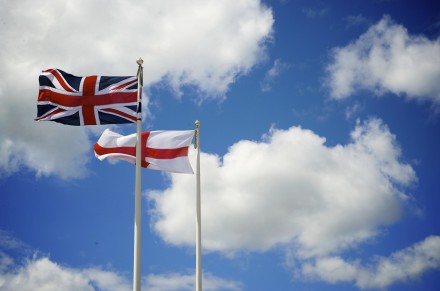

Launching the first full academic study of how an English Parliament might work, the Director of the Constitution Unit, Professor Meg Russell, wrote “since the establishment of the devolved assemblies…some have proposed that England should have a parliament of its own. The proposal initially secured little mainstream support. In recent years, however, a growing number of senior politicians from across the political spectrum have shown interest in an English Parliament as a possible solution to the ‘English question’”. Those politicians include Tristram Hunt and Chuka Umunna and left activists like Billy Bragg.
According to Eddie Bone, the campaign director of the campaign for an English parliament, (CPE) the choice is stark: an English parliament, or see the UK break up amid demands for English independence. True, it’s not demand you will probably hear today from your friends and neighbours. And for the moment, most of Labour adopts Derry Irvine’s response to the anomaly of Scottish MPs determining English laws on devolved issues: “the best answer to the West Lothian question is to stop asking it”.
As the CPE sees its demand move from the wilder fringes to command serious attention in polite political and academic society, it can’t be denied that they have nagged away at serious questions that will have to be answered sooner or later. Recent debate has focussed around English votes on English laws, but parliamentary procedure is not the real or only aim of campaigners for an English parliament. They want an English government able to govern for England.
England, of course, does not have its own government, even on issues devolved in other parts of the UK. Instead, the UK Government acts both on behalf of the UK as a whole and as the government of England. While the late Robin Cook (and Scottish MP) believed that, after devolution, no Scottish MP could be Secretary of State for Health, many Welsh and Scottish MPs were appointed as ministers for English issues in the last Labour Government.
When the English majority party is the same as the UK majority party, it doesn’t usually seem to matter most of the time. It only came to a real head – though very close to a government defeat – when Scottish Labour MPs voted to impose higher tuition fees on English students. This was against the wishes of many English Labour MPs and would not apply to Scottish students. In 2016, English voters appear to have the Tory government they voted for and to be relatively happy with it. It is a very ‘English’ government with the flagship grammar school policy only applying in England.
But the political trajectories of the four parts of the UK are moving in increasingly different directions, with different parties contesting and winning in each nation. The chances of clashes between the UK majority and the interests of England around issues as diverse as the Barnett formula, the placing of shipbuilding orders, and teaching British values in schools can only increase.
There is particular issue for Labour. It is now easier, though not easy, for Labour to win an English majority than a UK majority. If that happened, nothing in the current constitution would allow the formation of an English Labour government. At best it would have to form a coalition of some sort with different parties from other parts of the UK to be allowed to implement the Labour policies English voters had chosen. No doubt these other parties would extract their own price for cooperation.
Some crucial issues may arise more imminently. If the government of Scotland wins the right for the devolved nations to have a legal say on Brexit, can we assume that the UK government can fully represent the interests of England whilst trying to manage the whole process? At the very least, it is likely that we will see more and more occasions when the demands on the UK government means it cannot adequately speak for England too.
In the wake of Brexit, Gordon Brown recently proposed a constitutional convention to create a federal structure for the UK. That’s a welcome call and admission that the current structures cannot last forever under the strains of different national and regional interests. Unfortunately he undermined his own argument by insisting that a federal UK should be based on English regions and not England as a whole. He also seems to believe that English law and government should continue to be made by the UK government, with only limited administrative powers devolved to English regions. Certainly he did not advocate legislative powers for English regions akin to those of Scotland, Wales or Northern Ireland.
This approach compounds the English problem. Most English ‘regions’ have no political, cultural or economic reality. There is no one to represent English regions in a constitutional convention, and no structure able to exercise new powers. If a minister as committed and energetic as John Prescott failed to establish regional structures that could resist the Tories for a fortnight, it is difficult to see where popular support would come for them today.
This all ignores the real local structures that are emerging across England. The devolution process is pretty chaotic and baldy managed but, nonetheless, collaborative structures based around local authorities and broadly reflecting areas people recognise are emerging. These, rather than artificial regions, must be the lower power bases of a future England.
But a key dilemma remains. From whom do the new combined authorities gain their powers? From a UK government, inevitably influenced by the interests of the whole UK, or from a body that is elected by and represents England as a whole? In every other part of the UK the answer would be ‘from the elected national assembly or parliament’. Campaigners for an English Parliament would argue that the same should apply in England.
The final question is whether England, so bitterly divided today, can find the way to heal itself when there is no place or forum in which England and English representatives can even meet to discuss how the nation can be healed?
The arguments against a parliament and government are not easily put to one side. There will be little public demand for anything that requires more politicians and more civil servants. When asked, English voters tend to favour a parliament, but not with much enthusiasm. Over 100 years ago Churchill – reflecting on the prospect of Irish Home Rule – worried that the union would be threatened by an England that would be so dominant over the smaller nations.
These arguments have always successfully been used to resist change. But it is becoming harder to ignore the questions the campaign for an English parliament are raising. If their answer is wrong; others need to say what the alternative is more convincingly than they have done to date.
Professor John Denham is a former Labour cabinet minister, and director of the centre of English identity and politics at Winchester University. Eddie Bone’s lecture at Winchester University can be found at www.winchester.ac.uk/ceip




More from LabourList
Labour publish ambitious child poverty strategy to lift over half a million kids out of poverty by 2030
2026 mayoral elections to be postponed for two years, government confirms
Labour MSs accuse Keir Starmer of ‘undermining devolution’